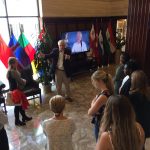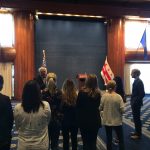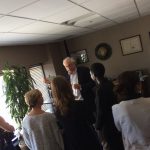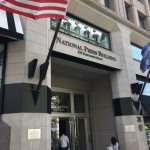The most powerful story people can tell is their own. Today, professor of journalism Iris Krasnow gave our class its first assignment, and it amounted to this: visit an unfamiliar location in Washington, DC, and write about people who are familiar with it. Prof. Krasnow claimed she assigned this work only so that she could see how we write, but her assignment also will teach us what it means to do journalism.
Journalists share information. They obtain facts from a few knowledgeable people and pass them along to less knowledgeable people in the form of a story. This story captures attention and helps the audience retain what information it has received. If the journalist writes well enough, the information and its emotional import can influence how people act. In other words, good journalists can educate, entertain, and persuade all at once.
Organized journalism in DC today dates back to 1908 when one-legged reporter Graham Nichol met fellow journalist James Hay on 14th Street and complained about the lack of a local club for news writers. Hay found the situation equally off-putting, and the two men immediately went to the 12th Street police station to register would-be members. Thus the oldest continuous DC press club was born. While other clubs had come and gone before what is known today as the National Press Club, Club Historian and American University professor Gilbert Klein says the National Press Club stayed standing for one reason and one reason only: the controversial decision to refuse credit to all journalists at its bar. With its potentially highest expense eliminated, the National Press Club could serve as a secure gathering place for journalists of the US capital.
Our journalism and new media class visited this historic site before our meeting with Prof. Krasnow. Prof. Klein gave us a tour and took us around the building to see photographs of its famous guest speakers and educate us on its long, storied history. This history includes its merger with the Women’s National Press Club, a merger that took place as recently as 1985. Women’s equality, Prof. Klein reminded us, was a relatively new concept, and our work in DC would continue to remind us of the debt we owed to those who paved the way before us—for better or worse.
I am still waiting for a response from my supervisor at the Columbus Dispatch. If the experience of prior interns indicates anything, I may find myself reporting stories that make the front page of a historic newspaper. Only time will tell. Whatever happens, I am fortunate to be in DC, even if I am missing my friends and family back in the Sunshine State. Until next time, I am always
Sincerely yours,
Michael Dulman




